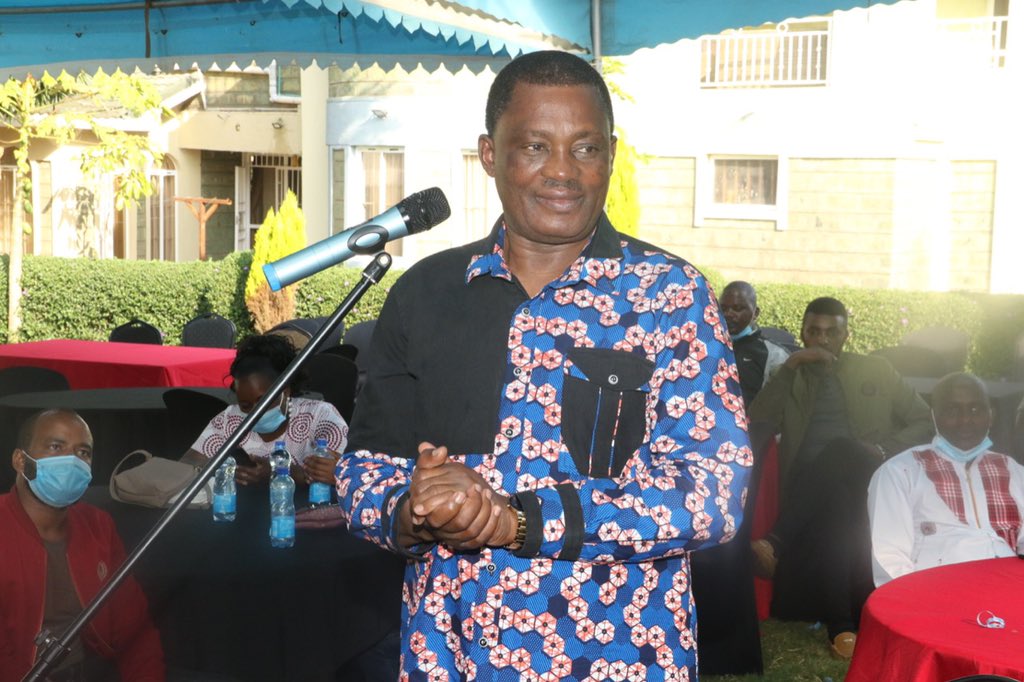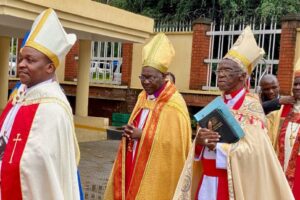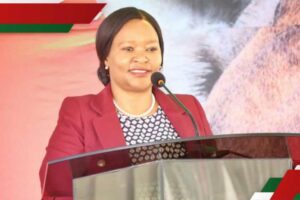The recent couple of months have been a whirlwind of activity for current speaker of the National assembly and former MP Justin Bedan Muturi (commonly referred to simply as JB by close associates and friends).
From the fractious blessing by the Kikuyu Council of Elders at the Mukurwe Wa Nyagathanga, the Agikuyu people’s Garden of Eden, but which revealed a split within this previously highly regarded custodian of Kikuyu culture and interests, and his cleansing and ceremonial coronation as Mt. Kenya spokesman by the Council of the Njuri Ncheke.
The ceremonies were the culmination of an eight-day series of events that saw Muturi enter a strict, special cultural regimen at his Thigiri Ridge residence that included eating only certain things, bathing in a certain manner and avoiding coitus for the period.
JB Muturi has attempted to secure the bag at home in the populous Mt. Kenya region for the obvious reason that it holds a critical mass of votes, enough to singularly determine who becomes President of the Republic.
It is for this exact same reason that DP William Ruto has spent an inordinate amount of time and resources over the last decade on a cash-fueledcharm offensive in the region, where incidentally, he has previously been viewed negatively.
Does installation as spokesman of the Mt. Kenya region by the likes of the Njuri Ncheke and Kikuyu Council of Elders hold any political sway in the region?
Well, the jury is still out on this question, given a multiplicity of factors affecting the region and the less-than-flattering view of these organisations by a large majority of youthful voters.
Moreover, factions within both of these traditional councils would later emerge to denounce JB Muturi’s installation as elder and spokesman and revealing just how tricky it is to attempt to garner the impartial support of these councils.
William Ruto understood this from the very beginning and chose to side-step the traditional council of Elders route, preferring instead to penetrate through the soft underbelly of the Christian Church in Mt. Kenya region, which has a massive following on the one hand, and a cash-hungry leadership to wit.
In the decade that Ruto has courted the Christian Church in Mt. Kenya, there have simultaneously emerged open verbal disagreements between the traditionalists and the modern Christians. On the surface it has seemed as though they have been at loggerheads over central belief systems but a closer scrutiny of it all has revealed a viciouscatfight over who will steer/sway a majority of votes in a certain direction and the financial windfall that would come with it from the political victor.
Enjoined in this battle, no less than legendary politician Koigi Wa Wamwere who openly rejected the appointment of National Assembly Speaker as Mt. Kenya kingpin by the Njuri Ncheke council of elders.
Koigi held the opinion that Justin Muturi lacks attributes that qualify him for both ethnic and national leadership such as fighting for independence, freedom, democracy, the second liberation, rule of law and equality.
The criticism of JB Muturi came around the same time that he pronounced his own political ambitions of becoming President in the 2022 elections.
Last month, the Democratic Party (DP) granted JB Muturi the flag for the Presidential candidacy.
Even before this, his close friend and political mentor President Uhuru Kenyatta had also publicly opined that it was time for other communities to advance to the Presidency of the country, an opinion that the Speaker attempted to gently prod away with diplomatic language.
Politics of the Mountain and Uhuru succession aside, what do the majority of people in this country see when they look at Speaker JB Muturi?
Granted, Muturi has had a chequered albeit bland and unremarkable career in public service, he almost always seems to sit on the wrong side of history.
An Almunus of Kangaru High School for both his “O” and “A” levels and later University of Nairobi for his Law degree, JB Muturi counts among his peers at UON Law campus the likes of Senator Moses Wetangula, Mohammed Ibrahim(Supreme Court), Fatuma Sichale and Jessie Lessit (CoA)and at least 5 more Justices of the High Court.
He also held the tenure of Secretary-General of the Kenya Law Students Society (KLSS) at a time of political upheaval at the University that would see the likes of Otieno Kajwang and Mukhisa Kituyi expelled, and having to complete their studies at Makerere University.
His tenure was unremarkable and safe unlike otherfirebrand predecessors like James Orengo.
After coming through the Kenya School of Law circa 1982, he would immediately be absorbed by the Judiciary to work as magistrate beginning in Bungoma, in a career that would span close to 15 years.
Trumped up bribery charges that were eventually thrown out by the courts forced him to reconsider his career in the judiciary and his resignation led him down the road less travelled, to becoming a Parliamentarian.
In 1997, he would go back to Siakago constituency to vie for MP on a KANU ticket, which he lost to Silas M’Njamiu Ita who had vied on a DP ticket.When Ita died in 1999, Muturi won the by-election.
In 2002, despite the NARC wave in the Mountain region, he managed to retain his seat on a KANU ticket, no mean feat by any stretch of the imagination.
However, KANU was now in the opposition and Uhuru Kenyatta the official leader of the opposition. JB Muturi became the KANU whip in Parliament and chair of the Public Investments Committee.
Can JB Muturi be remembered for doing anything remarkable in his 8-year tenure in Parliament?
In all this time he was part of the KANU establishment, a retrogressive party whose central belief structure was at odds with the aspirations of the Kenyan people. That JB Muturi felt safe in that fold for whatever reason, must really confound anyone looking at him as a possible Presidential contender, or more likely, as a running mate to a real contender.
Fast forward 2013, JB Muturi had been in the political cold since losing the election in 2007 and was moonlighting with Deputy PM Uhuru’s people at UK Centre (next to Parliament). He once again lost his bid for MP in 2013 on a TNA ticket.
However, his political benefactor Uhuru Kenyatta was now President and he automatically fingered JB Muturi for the post of Speaker of National Assembly, a position that he has held to this day.
The thoughts in many people today are, what has JB Muturi stood for over the years that gives him a sense of entitlement to the Presidency, a run that he has begun barely a year to the polls or is it just opportunism now that Uhuru Kenyatta will be out of the picture, and the region apparently needs political point men?
How did JB Muturi feel in the 90s and early 00’s to sit a Parliament filled with achievers of Kenya’s second liberation like the vaunted Raila Amolo Odinga, James Orengo, Gerald Otieno Kajwang, Geroge Moseti Anyona, Koigi Wamwere, Mukhisa Kituyi and many others, some of whom he will be competing against for the Presidency in 2022?
What were the achievements of the 11th and 12thParliaments that he has overseen and how have they affected the people of Kenya?
How many laws have been passed by this two Parliaments and been thrown out by the courts for being unconstitutional? Hasn’t the current 12thParliament existed in breach of the constitution on the basis of gender composition? Didn’t the 11thand 12th Parliaments allow the Government to get into a debt trap that has sunk the country into a recession?
What has Parliament done with reports of the auditor-general on the biggest financial scandals in the country rather than parade those accused to mock Kenyans on live television by asking them “mta-do?”
Haven’t the 11th and 12th Parliaments been the most chaotic in our history, sorely in need of leadership, which many agree has been lacking from its leadership?
Most importantly though, the people of Mt. Kenya are asking how JB Muturi will extricate himself from the blame of the economic chaos and desolation wrought upon them by the Uhuruto kakistocracy?
JB has much to answer for, and his stab at either the Presidency or attempt to beautify him as a potential running mate is leaving many scratching their heads.
He has the potential to be a credible candidate on one hand or a terrible liability on the other depending on how he plays his cards.
But the weight of history weighs down on him heavily


















